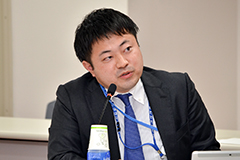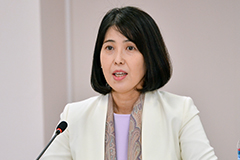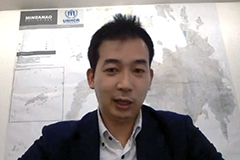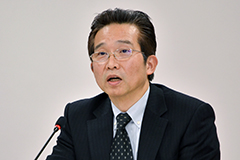Webinar Series on Peace in Mindanao: Part 2—How to Build Trust in International Cooperation?
2021.04.12
On Feb. 24, 2021, JICA Ogata Sadako Research Institute for Peace and Development and JICA Southeast Asia and Pacific Department held a Japanese-language webinar entitled “JICA's Efforts to Support Peace in Mindanao, the Philippines: Considering Trust Building in International Cooperation (provisional translation).” This is the second part of a two-part webinar to discuss peace and development in Mindanao, the Philippines.
Watanabe Daisuke, director of JICA Southeast Asia Division 5 of JICA Southeast Asia and Pacific Department, opened the session by saying, "Japanese government and JICA have been providing peacebuilding assistance to Mindanao, the Philippines for nearly 30 years. We are about to witness a historic moment with the establishment of an autonomous government. I hope that real voices of those who have been on the front lines of support for Mindanao will help draw the public's attention to peace and development in Mindanao.
First, Miyazaki Toshiki of JICA Southeast Asia and Pacific Department went over the history of the Mindanao conflict and said, "The Mindanao conflict is often described as a conflict between Muslims and Christians, but in fact it is not so simple.” He also used a correlation chart to explain the complexity of the stakeholders, including the clan feuds known as “Rido” in the local language, which further complicate the situation.
Next, Taniguchi Miyoko, JICA senior advisor on peacebuilding, who has been involved in a number of peacebuilding assistance projects in Mindanao, introduced JICA's 30-year history of cooperation, based on the report "Comprehensive Review of JICA’s Assistance in Mindanao," which was completed in February 2021. The report describes the whole of the government approach that encompasses development, security (mainly ceasefire monitoring in this case), and diplomacy as a distinctive feature of Mindanao assistance, and also reviews each of the four phases of the peace process and changes in aid policy, as well as the three areas of strengthening governance, economic development, and community development. Taniguchi explained the significance of Japanese support for peace in Mindanao, saying, "JICA's support for Mindanao has contributed to peace and development by building trust among the various stakeholders, utilizing the human network cultivated through the continuous implementation of projects.”
Ebisawa Yo, senior representative of JICA Philippines Office, who participated online from the project office in Cotabato, Mindanao, explained about JICA's current cooperation with the Bangsamoro Transition Authority (BTA), which was established in 2019 and will become officially Bangamoro Government in 2022. He listed the following efforts made by JICA: the organizational design of the BTA, strengthening of governance and administrative management capacity, including capacity building of staff who are not familiar with government management and administration, and support for the budget formulation process; socio-economic development projects to improve livelihoods, including the development of a road network to improve connectivity and the provision of low-interest loans to small-scale farmers involved in agriculture as a key industry; and support for the normalization (demobilization and disarmament of soldiers) and reintegration process, including agricultural extension support for communities with soldiers of the Moro Islamic Liberation Front (MILF).

Miyazaki Toshiki of JICA Southeast Asia and Pacific Department went over the history of the Mindanao conflict

Taniguchi Miyoko, JICA senior advisor on peacebuilding, introduced JICA's 30-year history of cooperation

Ebisawa Yo, senior representative of JICA Philippines Office, explained about JICA's current cooperation
In the panel discussion that followed, JICA staff member Ochiai Naoyuki, who has been involved in Mindanao assistance over a long period of time and authored a book of the Project History series, "Peace and Development in Mindanao, Republic of the Philippines: The Long Road to Peace through Trust," joined the panel to exchange various opinions on the theme of building trust in international cooperation.
Taniguchi said, "The peace process is still underway, and the Bangsamoro Transition Authority (transitional autonomous government) is now taking on the historic challenge of overcoming the history of social division, and creating a new identity and political community called “Bangsamoro” based on the right to self-determination and social justice. It is necessary for the international community to continue its support for peace and stability in the Bangsamoro region that would lead to stabilizing the entire region in Asia, and to contribute to building the foundation for an autonomous government. Besides, it is essential for us to be impartial as outsiders, to be humble in our knowledge and understanding, to understand local political realities, history and culture in order not to intervene in politics unconsciously, to respect the activities of people who are working for the public good, and to provide the necessary skills, knowledge and values in a timely manner.” Ebisawa then said, "One of the differences between peacebuilding assistance in Mindanao, Philippines and other countries is that in Philippines, the trust in Japan and JICA is really strong. We could gain their trust by meeting their needs as quickly as possible and delivering results. It is important to have empathy for the people you're working with.” Ochiai said, "After the peace agreement between the Philippine government and the Moro National Liberation Front (MNLF) was signed in 1996, I met a man plowing a field in a farming village in Muslim Mindanao area on a business trip, and he had an automatic rifle on his back. It's not simple just becoming a farmer if you have grown up in a war zone. I imagined what it would be like if I were him. Thinking of others as yourself is the starting point for building trust.”

Ochiai Naoyuki, JICA staff member, participated in a panel discussion
There was a lively discussion on various questions from the webinar participants. Takeda Sachiko, deputy director of JICA Southeast Asia and Pacific Department, concluded the webinar by saying, “JICA will continue to do its utmost to respond to the wishes of all of our stakeholders in the Philippines.”

事業事前評価表(地球規模課題対応国際科学技術協力(SATREPS)).国際協力機構 地球環境部 . 防災第一チーム. 1.案件名.国 名: フィリピン共和国.

事業事前評価表(地球規模課題対応国際科学技術協力(SATREPS)).国際協力機構 地球環境部 . 防災第一チーム. 1.案件名.国 名: フィリピン共和国.

事業事前評価表(地球規模課題対応国際科学技術協力(SATREPS)).国際協力機構 地球環境部 . 防災第一チーム. 1.案件名.国 名: フィリピン共和国.

事業事前評価表(地球規模課題対応国際科学技術協力(SATREPS)).国際協力機構 地球環境部 . 防災第一チーム. 1.案件名.国 名: フィリピン共和国.

事業事前評価表(地球規模課題対応国際科学技術協力(SATREPS)).国際協力機構 地球環境部 . 防災第一チーム. 1.案件名.国 名: フィリピン共和国.
scroll